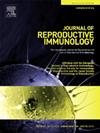The impact of platelet-rich plasma (PRP) on ovarian function and oocyte quality: A comprehensive review
IF 2.9
3区 医学
Q3 IMMUNOLOGY
引用次数: 0
Abstract
Ovarian aging, premature ovarian insufficiency (POI), and decreased ovarian reserve (DOR) are major challenges in reproductive medicine, and few treatments are available to restore ovarian function reversibly. Platelet-rich plasma (PRP), an autologous concentrate rich in bioactive growth factors, has been proposed as a regenerative therapy for reversing ovarian aging. Recent evidence suggests that PRP enhances the ovarian endocrine function and oocyte competence by stimulating major survival signals, reducing oxidative stress, and promoting mitochondrial biogenesis. Preliminary clinical evidence and case reports show the potential for successful reproduction following intraovarian PRP administration. By critically evaluating existing clinical evidence and discussing the molecular mechanisms involved, this article highlights the potential PRP to act as a minimally invasive, autologous, and novel fertility regenerative strategy. It also emphasized the implementation of standardized protocols and robust clinical trials to establish the effectiveness of PRP in reproductive medicine. Therefore, this review aims to critically evaluate existing literature on the effects reported to date, while highlighting the very-low-certainty evidence base and the imperative for large, sham-controlled randomized trials to confirm efficacy and long-term safety.
富血小板血浆(PRP)对卵巢功能和卵母细胞质量的影响:综述。
卵巢老化、卵巢功能不全(POI)和卵巢储备功能下降(DOR)是生殖医学面临的主要挑战,目前很少有治疗方法可以可逆地恢复卵巢功能。富血小板血浆(PRP)是一种富含生物活性生长因子的自体浓缩物,已被提出作为逆转卵巢衰老的再生疗法。最近的证据表明,PRP通过刺激主要生存信号、减少氧化应激和促进线粒体生物发生来增强卵巢内分泌功能和卵母细胞能力。初步的临床证据和病例报告显示卵巢内PRP管理后成功生殖的潜力。通过批判性地评估现有的临床证据和讨论所涉及的分子机制,本文强调了PRP作为一种微创、自体和新型生育再生策略的潜力。它还强调实施标准化方案和强有力的临床试验,以确定PRP在生殖医学中的有效性。因此,本综述旨在批判性地评估迄今为止报道的有关疗效的现有文献,同时强调极低确定性的证据基础以及进行大型假对照随机试验以确认疗效和长期安全性的必要性。
本文章由计算机程序翻译,如有差异,请以英文原文为准。
求助全文
约1分钟内获得全文
求助全文
来源期刊
CiteScore
6.30
自引率
5.90%
发文量
162
审稿时长
10.6 weeks
期刊介绍:
Affiliated with the European Society of Reproductive Immunology and with the International Society for Immunology of Reproduction
The aim of the Journal of Reproductive Immunology is to provide the critical forum for the dissemination of results from high quality research in all aspects of experimental, animal and clinical reproductive immunobiology.
This encompasses normal and pathological processes of:
* Male and Female Reproductive Tracts
* Gametogenesis and Embryogenesis
* Implantation and Placental Development
* Gestation and Parturition
* Mammary Gland and Lactation.

 求助内容:
求助内容: 应助结果提醒方式:
应助结果提醒方式:


